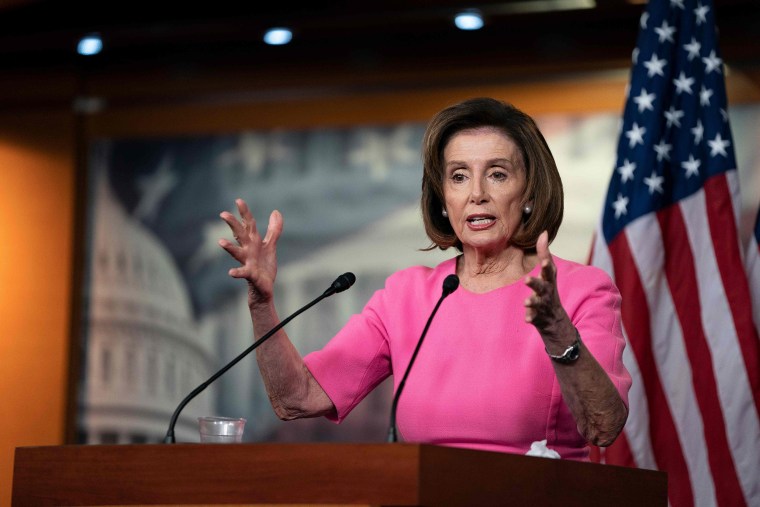Former Federal Reserve Chair Janet Yellen participated on a call yesterday with congressional Democrats, who heard Yellen address the economic effects of the coronavirus crisis. While the former Fed chief said much of the fallout will be shaped by health conditions, Yellen said the nation's unemployment rate was likely already 13%.
The Coronavirus Aid, Relief, and Economic Security (CARES) Act -- the $2.2 trillion economic aid package that recently became law -- will serve as a temporary lifeline for many of those hurt by the severe downturn, but there's a broad realization that the legislation was a down-payment on an economic crisis that's likely to linger. The question then becomes what federal policymakers are likely to do next.
On the show last night, House Speaker Nancy Pelosi (D-Calif.) told Rachel, "[W]e're preparing for CARES 2 already." The Associated Press reported on how it's taking shape.
...Pelosi said another $1 trillion is needed, beyond the just-passed $2.2 trillion effort. She wants another round of direct payments to Americans and more money for companies to keep making payroll. Senate Majority Leader Mitch McConnell has said in recent days that health care should top the list, signaling his intent to get to work on a new bill.
When it comes to federal legislative responses to the coronavirus crisis, as regular readers know, three bills were approved in quick succession last month. The first came in early March, when Congress passed a relatively modest $8.3 billion emergency bill, focused on public-health infrastructure.
Almost immediately thereafter, Pelosi and Treasury Secretary Steven Mnuchin negotiated a second package, called the Families First Coronavirus Response Act. With a price tag of roughly $100 billion, it provided, among other things, funding for free coronavirus testing, food assistance, and limited paid leave. It passed with minimal drama two weeks ago.
That, of course, led to Phase III -- the $2.2 trillion economic aid package -- and now Phase IV.
The first three bills were, all things considered, relatively easy lifts, despite their size. The relevant players seemed to recognize the scope of the crisis and the need for quick action. For his part, Donald Trump seems ready to sign whatever is put in front of him.
In theory, this month's bill may be more challenging, though it doesn't have to be. House Democrats, for example, were interested in including an infrastructure element in the new proposal, but they backed off when Senate Republicans balked. Similarly, the White House this week suggested it wanted to see a capital-gains tax break in the package, but Dems wasted no time in making clear that this is a "ridiculous" non-starter.
A Washington Post report noted, "Although there is some overlap in the political ideas, significant differences remain, and it's unclear whether the sides will be able to reach a deal in the coming weeks." The article added, however, that Pelosi and Senate Majority Leader Mitch McConnell (R-Ky.) have spoken directly, and the door is open to a deal.
My best guess is that the next bill will look quite a bit like the last one.
Looking ahead, Congress won't return to work until April 20, and even then, many members will find it necessary to stay away from Capitol Hill for health reasons. With this in mind, the challenge won't just be striking a deal on legislative terms, but also figuring out how to procedurally pass a bill once it exists.
Postscript: Especially in the wake of Wisconsin's fiasco, there will be a concerted push in Democratic circles to include mail-in balloting in this aid package. Expect it to be a key point of contention.

